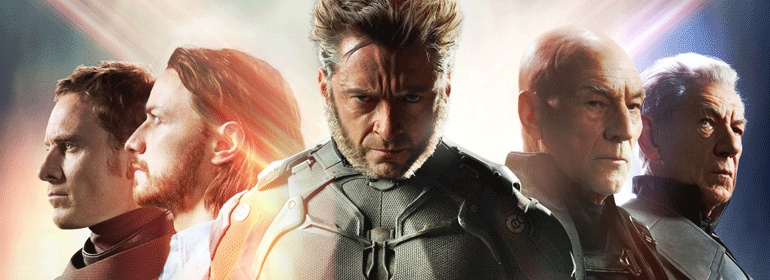The seventh film in the X-men series delivers on the laughs, thrills and drama. But does it still draw strong parallels with the LGBT experience? Peter Roche finds out.
Keeping track of the X-Men film franchise can be very difficult, with spin offs, prequels, and infamous continuity issues. So, here goes a quick recap of where we stand with the latest X-men film – the seventh in the series, and third directed by bisexual Bryan Singer, it’s the direct sequel to the first prequel, First Class.
In 2023 the Mutants are on the brink of destruction at the hands of the Sentinels, a fearsome host of Mutant hunting machines. The Mutant intelligentsia, Charles Xavier (Patrick Stewart) and Erik Lehnsherr (Ian McKellen) trace the root of the Sentinels to the 1970’s, when Mystique (a sexy blue Jennifer Lawrence) assassinates Bolivar Trask (Peter Dinklage of Game of Thrones fame). As astounding luck would have it, Kitty Pryde (an apt character name for Ellen Page) has recently learned the handy trick of sending things back in time. So she closes her eyes and taps her heels together three times and whoooosh Logan/Wolverine (Hugh Jackman) is catapulted back to the only decade where his sideburns look normal.
This brings us satisfyingly back to where First Class left off, and from here Logan has to make Charles and Erik (their younger selves now played by James McEvoy and Michael Fassbender) see eye to eye again, before intercepting Mystique as she inadvertently gets ready to herald the end of the Mutant race.
It’s a plot that could run away with itself, but Singer keeps it very accessible and even those who are new to the franchise will be able to keep up. Still, there is a wealth of sly references to events in previous films and cameos from lesser-known Mutants, which will surely keep die hard fans entertained.
The film is never afraid to have fun, which is refreshing, given that fun hasn’t been in vogue for super heroes since The Dark Knight. Audiences of all ages will be sure to delight as the alternate history precipitated by the X-men interfering in the past unravels – it’s sort of like a camp version of Watchmen.
However, sometimes Days of Future Past feels like the franchise has lost its sense of standing up for the little guy. The struggle of the Mutant community traditionally draws blatant parallels to that of any other stigmatised group: LGBT, racial, ethnic, or otherwise. This time around that allegory feels a little thin.
The X-men series is in good hands with Bryan Singer, who has already been confirmed as director for 2016’s X-men Apocalypse. With such a stellar ensemble cast and perilously risky plot, Days of Future Past could have been the disaster movie (in all the wrong ways) of the summer. Thank Marvel it’s not.
X-Men Days of Future Past is currently on general release.
© 2014 GCN (Gay Community News). All rights reserved.
